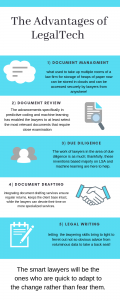AI, Machine Learning, and the changing practice of law
The refinement of legal practice
The legal practice demands specialized experience and knowledge of the law. Therefore, the impact of the technology differs across the spectrum. Here we analyze a few of the many advantages a lawyer can gain from legaltech:
Document Management
The task of document management requires that a lawyer has exceptional organization, maintenance, knowledge, and time management skills. This task does not necessarily demand specialization in any area of law and can even be done by a non-lawyer who has some understanding of filing and indexing documents. Now, heaps of documents that used to take up multiple rooms for storage can be stored in the cloud and can be accessed securely by lawyers from anywhere! There are many document cloud storage service providers today who offer secure data storage (e.g., eFile Cabinet; Mind Tree). This is an example of basic integration of legal technology streamlining systematic storage and retrieval of a firm’s knowledge.
Document Review
Similarly, partnership between lawyers and technology for document review also benefits the practice of law, especially for big mergers or discovery. Everyone can agree that searching through large amounts of data to find a single problematic area is nothing short of a nightmare for young lawyers. Advancements in predictive coding and machine learning have enabled lawyers to select the most relevant documents for close examination, making the lives of lawyers much simpler. Rather than threatening lawyers, these systems make lawyers’ jobs much more efficient.
Due Diligence
Similar to document review for discovery purposes is the practice of reviewing documents in the process of due diligence. Here, a lawyer is expected to scan possible red flags in a transaction. There are elements like the Latent Semantic Analysis (LSA), which analyses similarities in the meanings of words, that help discern what documents are the most relevant for a particular inquiry. However, the LSA has a significant limitation of not being able to distinguish the usage of a word in a broader context, not just in the context inferable from surrounding words. A sharp lawyer can pinpoint red flags from very limited information that might not necessarily follow a particular pattern. However, for any instruction-based system, patterns are important! Thankfully, these inventions based on LSA and machine learning are here to help.
Document Drafting
With the explosion of innovation, savvy lawyers are embracing Legal document automation for document drafting. Various non-lawyer enterprises have entered legal document automation to serve clients looking for affordable solutions for drafting deeds, wills, or other contracts. Lawyers have been able to build on existing knowledge and customize templates for legal document automation to reflect the individual needs of their clients. Therefore, it is hardly surprising that there are already multiple online platforms that cater to the users directly (e.g., LegalZoom, Rocket Lawyer, etc.). While legal document automation has definitely put junior lawyers and law firms that provide unspecialized services at a disadvantage, the lawyers involved in high-stake transactions for their specialized knowledge will hardly be affected. On the contrary, integrating legal document automation services into a firm and charging nominal cost for automatically generated documents would actually ensure regular returns, keep the client base intact, and enable lawyers to devote their time to more specialized services.
Legal Writing
People often confuse legal writing with legal drafting, but they’re actually quite different. At first glance, it might seem that legal writing memos are fairly structured documents that could easily be automated, but they realistically aren’t structured apart from the introductory and concluding paragraphs. Legal writing is a service where a lawyer reveals their skills using criterion and laws that support their advice. The same precedent could be used in favour or against the advice being made and the lawyer sometimes could use various parts of the precedent depending on the situation. Therefore, it is definitely not as structured if it can be coded into a series of instructions while letting the actual lawyering skills take a back seat!
While it is not difficult to recognize that there are some unavoidable changes that are happening in the practice of law, one has to come to terms with the fact that it’s better to embrace the change than to push it away. If you fail to incorporate innovation into your practice, you face being left in the dark ages while the world moves into a more advanced, technological world. The smart lawyers will be the ones who are quick to adapt to the change rather than fear it.



